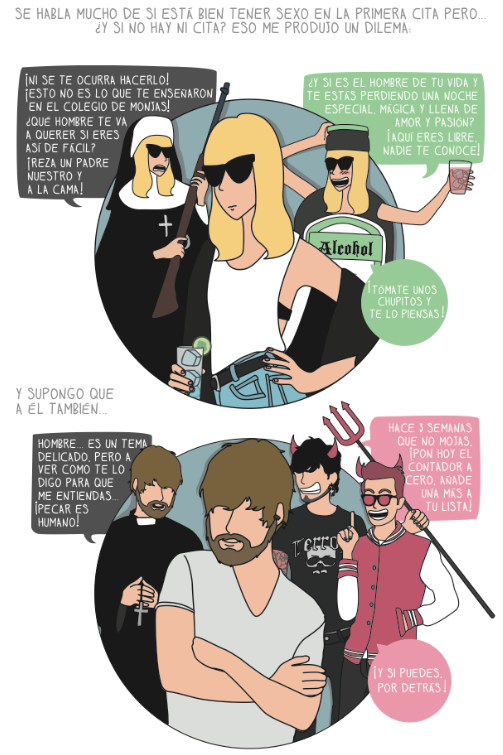Moderna de Pueblo: A self-aware series of graphic novels about hipster hijinks in Madrid
I have been using Spanish graphic novels in an attempt to learn slang and expletive phrases in order to reinforce my grasp of the language. While browsing volumes in La Central, one book caught my eye. El Cooltureta is a relatable story because it follows a group of young people that live in Madrid. The creator, Raquel Córcoles, is credited by her pen name, Moderna de Pueblo, which doubles as the name of the series.
The artist nails the portrayal of my adopted city. The first panel of the book begins with the protagonist on his balcony in Anton Martin, admiring the street below while thinking to himself, “Acaba de mudarme y estaba totalmente enamorado del barrio.”
The first story follows its titular protagonist as he adopts a hipster identity. El Cooltureta relocated to Madrid from an unnamed, generic pueblo and seized the opportunity to recreate himself as a stylish, trendy, pseudo-intellectual.
Each panel portrays a broad spectrum of scenarios that young people can relate with—dealing with roommates, unrequited love, awkward communications via Whatsapp and the troubles that stem from relentless over thinking.
The central conflict of this first story is that El Cooltureta wants to engage in the vast cultural offerings of Madrid, such as screenings in the Cine Dore, but he is too awkward to go alone. El Cooltureta searches for a social circle that he can thrive in, and gradually meets several characters whose names are their endearing archetypes: the tortured friend, the cinefile, la chica de la bici, la mariliendre etc.
The series is full of cultural references, both mainstream and otherwise. There is one instance where the protagonist is de resaca and watching the mindless television series New Girl. When a friend calls to check up on how he’s doing, he lies to maintain the illusion of his dignity by telling her that he’s watching (my favorite series) The Wire. A climactic scene of the story occurs during a performance by Die Antwoord, which the protagonist only attended begrudgingly. At every stage the characters are either heavily endorsing, or making snarky comments about, various forms entertainment and media. One character is often seen wearing a shirt that says in bold lettering “All blogs post the same stuff.”
After becoming heavily emotionally invested in the characters I picked up the second book, Los Capullos no regalan flowers (Dickheads don’t gift flowers) which follows an unnamed female protagonist. The second book outshines the first in my opinion because it has more of a clearly defined plot. Similar to El Cooltureta, the female lead moved to Madrid from a generic pueblo and hopes to take advantage of her recently acquired freedom. Each chapter, titled after different capullo archetypes, follows her endearingly awkward search for love. It is neatly fitting that she has a poster of Woody Allen’s classic film, Manhattan, right above her bed. She is a hopeless romantic who gets swept up in the world of Tinder, nightclubs, & Whatsapp courtship. Although her view on relationships and romance evolves as she adjusts further to her new environment, the old-school romantic in her secretly hopes that one of her partners will bring her flowers.

The female protagonist of the second book bears a striking resemblance to the series creator.
One of her many less than ideal dates was with the male protagonist of the first book, who stayed true to his character and talked her ear off. Her internal dialogue as she makes decisions throughout the story is quite comical. She does her best to be open to the various types of modern flings–open relationships, long distance relationships, and relationships with flatmates. As the chapters progress, the female lead becomes increasingly frustrated with her circumstances.

Internal dialogue
She returns to her pueblo temporarily to seek clarity. While away from Madrid she has the epiphany that I’ve had time and time again—Madrid is a uniquely special city to which my hometown (as much as I respect it) pales in comparison. Upon returning to Madrid she continues her personal journey with further conviction.
Although both books were lleno with unfamiliar slang, which I’ve had to pause at intervals and ask my roommate to explain to me, I was laughing at every turn. This self -aware series is a must-read for young adults living in Madrid because it pokes fun at us and the spectrum of tonterias that we partake in. Numerous panels of the comic, which still make sense out of context, are free on their Facebook page & website, “Moderna de Pueblo.” If you become hooked, I encourage you to purchase both texts at your nearest La Central.
Web Shop Image credit: All of the imagery that appears above are samples from the Moderna de Pueblo website and their Facebook page
